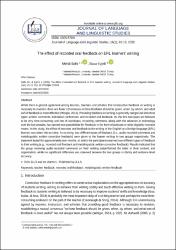| dc.contributor.author | Solhi, Mehdi | |
| dc.contributor.author | Eǧinli, İlknur | |
| dc.date.accessioned | 2021-01-27T11:45:59Z | |
| dc.date.available | 2021-01-27T11:45:59Z | |
| dc.date.issued | 2020 | en_US |
| dc.identifier.citation | Solhi, M. ve Eǧinli, İ. (2020). The effect of recorded oral feedback on EFL learners' writing. Journal of Language and Linguistic Studies, 16(1), 1-13. https://dx.doi.org/10.17263/JLLS.712628 | en_US |
| dc.identifier.issn | 1305-578X | |
| dc.identifier.uri | https://dx.doi.org/10.17263/JLLS.712628 | |
| dc.identifier.uri | https://hdl.handle.net/20.500.12511/6418 | |
| dc.description.abstract | While there is general agreement among learners, teachers, and scholars that constructive feedback on writing is necessary to revision, there are fewer consensuses on how feedback should be given, when, by whom, and what sort of feedback is most effective (Weigle, 2014). Providing feedback on writing is generally categorized into three types: written comments, individual conferences, and recorded oral feedback. As the first two types are believed to be very time-consuming and lots of workloads, recording comments, along with the advances in technology over the last decades, has opened new possibilities for feedback in the form of podcasts or other digitally recorded means. In this study, the effect of recorded oral feedback to the writing of the English as a foreign language (EFL) learners was taken into scrutiny. In so doing, two different types of feedback (i.e., audio-recorded comments and metalinguistic written corrective feedback) were given to the learner writing in two groups respectively. The treatment lasted for approximately two months, in which the participants received two different types of feedback to their writing (e.g., recorded oral feedback and metalinguistic written corrective feedback). Results indicated that the group receiving audio-recorded comments on their writing outperformed the latter in their content, and organization, while no significant difference was observed between the two groups in clarity and sentence-level accuracy. | en_US |
| dc.description.abstract | Yazı yazma alanında yapıcı geri bildirim ile ilgili bir revizyon yapılması gerektiği görüşüne, öğrenciler,öğretmenler, ve araştırmacılar ortak olarak katılmasına rağmen, en etkili geri bildirimin ne, ne zaman, nasıl, vekim tarafından verilmesi hakkında ortak bir görüş yoktur (Weigle, 2014). Yazı yazma alanında geri bildirim üçgenel kategoriye ayrılmıştır: yazılı bildirimler, birebir konferanslar, ve kayıt edilen sözlü geri bildirim. İlk ikikategorideki yöntemler çok zaman aldığı ve iş yükü fazla olduğu için, son yıllarda hızla gelişen teknoloji sayesindekayıt edilen geri bildirimler icin, podcast ve dijital kayıt araçları gibi araçlar sayesinde geri bildirim verme alanıyeni olanaklara kavuşmuştur. Bu çalışmada, ses kayıtlı geri bildirim tekniğinin etkisi İngilizce’yi yabanci dilolarak öğrenen öğrencilerin yazı yazma alanında kullanılarak incelenmiştir. İki değişik geri bildirim yöntemi ikibenzer gruba uygulanmıştır. Bir gruba ses kayıtlı geri bildirim, diğer grup ise üstdilsel yazılı geri bildirimi yaklaşıkolarak iki ay uygulanmıştır. İnceleme sonuçlarına göre, yazılarında ses kayıtlı geri bildirim alan öğrenciler içerikve organizasyon alanında diğer grup öğrencilerine göre daha başarılı olurken, iki grup arasında cumle yapısıaçısından bakıldığında anlaşırlık ve doğruluk alanında belirgin bir farklılığa rastlanmamıştır. | en_US |
| dc.language.iso | eng | en_US |
| dc.publisher | Selcuk University | en_US |
| dc.rights | info:eu-repo/semantics/openAccess | en_US |
| dc.subject | Metalinguistic Written Feedback | en_US |
| dc.subject | Recorded Oral Feedback | en_US |
| dc.subject | Teacher Feedback | en_US |
| dc.subject | Öğretmen Geri Bildirimi | en_US |
| dc.subject | Ses Kayıtlı Geri Bildirim | en_US |
| dc.subject | Üstdilsel Yazılı Geri Bildirimi | en_US |
| dc.title | The effect of recorded oral feedback on EFL learners' writing | en_US |
| dc.title.alternative | İngilizce'yi yabancı dil olarak öǧrenen öǧrencilerin yazıları üzerine olan ses kayıtlı geri bildirimin etkisi | en_US |
| dc.type | article | en_US |
| dc.relation.ispartof | Journal of Language and Linguistic Studies | en_US |
| dc.department | İstanbul Medipol Üniversitesi, Eğitim Fakültesi, Yabancı Diller Eğitimi | en_US |
| dc.authorid | 0000-0002-0355-9171 | en_US |
| dc.authorid | 0000-0003-3317-7956 | en_US |
| dc.identifier.volume | 16 | en_US |
| dc.identifier.issue | 1 | en_US |
| dc.identifier.startpage | 1 | en_US |
| dc.identifier.endpage | 13 | en_US |
| dc.relation.publicationcategory | Makale - Uluslararası Hakemli Dergi - Kurum Öğretim Elemanı | en_US |
| dc.identifier.doi | 10.17263/JLLS.712628 | en_US |
| dc.identifier.scopusquality | Q2 | en_US |


















